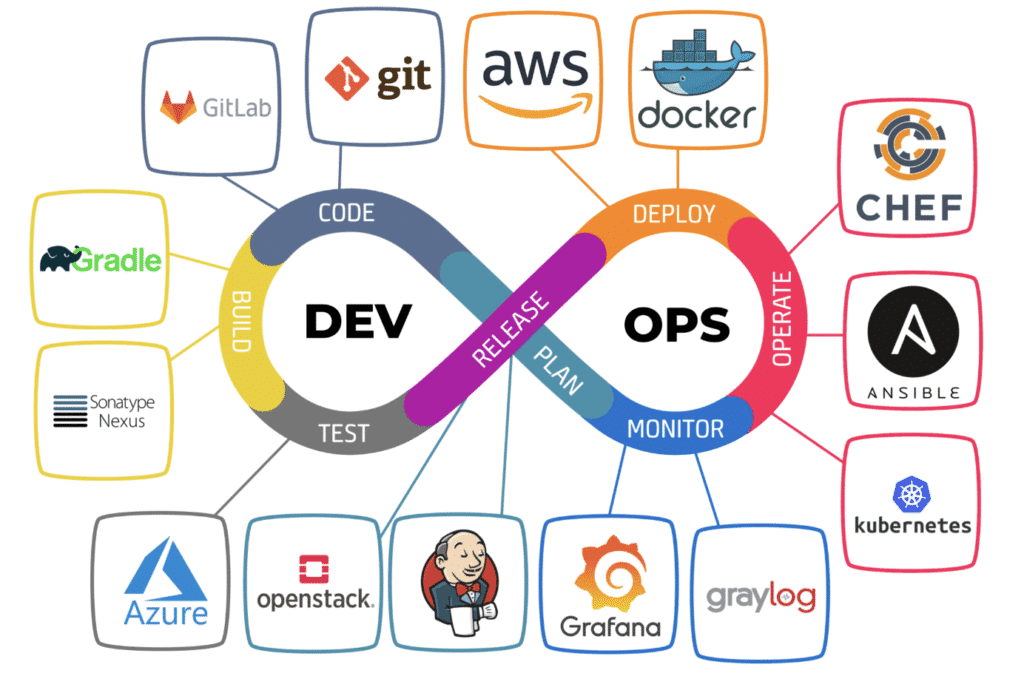Intersting DevOps facts:
What’s Remote DevOps All About?
DevOps is the glue between development and operations—making sure code gets out the door fast and stays up once it’s live. Remote DevOps developers take that mindset online, managing servers, deployments, and networks from wherever they are. They lean on tools like Docker for containers, Ansible for config management, and cloud platforms to spin up resources, all tied together with automation that cuts out manual grunt work. In 2025, it’s a must-have for teams who want speed without chaos, especially with distributed work being the norm.
Where Remote DevOps Shines
These developers thrive in all kinds of setups. For startups, they’ll rig a lean AWS pipeline to push updates daily without breaking the bank. E-commerce sites lean on them to handle traffic spikes—think Black Friday—with auto-scaling and load balancers. Big enterprises use them to orchestrate microservices across Kubernetes, keeping dozens of apps in sync. Anywhere you need cloud infrastructure humming or deployments that don’t crash at 3 a.m., remote DevOps folks deliver, no office required.
Who Are Our Remote DevOps Developers?
Our DevOps crew comes from all over—some with sysadmin roots, others who pivoted from coding gigs. They’re sharp with Linux, Bash, and Python, and they’ve usually wrestled with cloud platforms like AWS or Azure for years. Most have run CI/CD pipelines with tools like CircleCI or GitHub Actions and know their way around containers—Docker and Kubernetes are second nature. A lot have remote freelancing or startup stints, so they’re used to juggling time zones and Slack pings while keeping servers alive.
How to Spot the Right Remote DevOps Experience
How do you know a DevOps dev’s got the chops? Ask what they’ve managed—have they built a zero-downtime pipeline or scaled an app on GCP? Look for ones who’ve scripted Terraform stacks or debugged a Kubernetes pod crash at crunch time. Our devs can tell you about shaving minutes off builds with parallel jobs or locking down an S3 bucket tight. If they’ve got war stories—like recovering a borked prod server or tuning Prometheus alerts—they’ve been in the trenches and come out swinging.
Remote DevOps Tech in 2025 and Beyond
By March 2025, remote DevOps is hotter than ever—cloud adoption’s through the roof, and distributed teams aren’t slowing down. Tools like GitOps (think ArgoCD) are taking over, and our developers see Kubernetes eating more of the pie, with AWS EKS and Azure AKS leading the charge. Security’s getting tighter—expect zero-trust setups and AI-driven monitoring to pop up more. The future’s leaning into serverless and edge computing too, so hiring a remote DevOps pro now keeps you ahead as infra gets smarter and sprawls further. They’ll keep your stack humming wherever the tech winds blow.
TOP 30 DevOps Tools and Frameworks in 2025, and companies behind:
- Terraform – HashiCorp
- Kubernetes – Cloud Native Computing Foundation (CNCF)
- Docker – Docker, Inc.
- Ansible – Red Hat
- Chef – Progress Software
- Puppet – Puppet, Inc.
- GitLab – GitLab, Inc.
- Jenkins – Open Source Community
- CircleCI – Circle Internet Services, Inc.
- Azure DevOps – Microsoft
- AWS CodePipeline – Amazon Web Services
- Google Cloud Build – Google
- Argo CD – CNCF
- Spinnaker – Netflix/Google
- Prometheus – CNCF
- Grafana – Grafana Labs
- ELK Stack (Elasticsearch, Logstash, Kibana) – Elastic
- New Relic – New Relic, Inc.
- Datadog – Datadog, Inc.
- HashiCorp Vault – HashiCorp
- Consul – HashiCorp
- Istio – CNCF
- Flux – CNCF
- Sentry – Sentry, Inc.
- SonarQube – SonarSource
- Travis CI – Travis CI GmbH
- Nagios – Nagios Enterprises
- TeamCity – JetBrains
- Octopus Deploy – Octopus Group
- Pulumi – Pulumi Corporation
Talk to Our Expert

